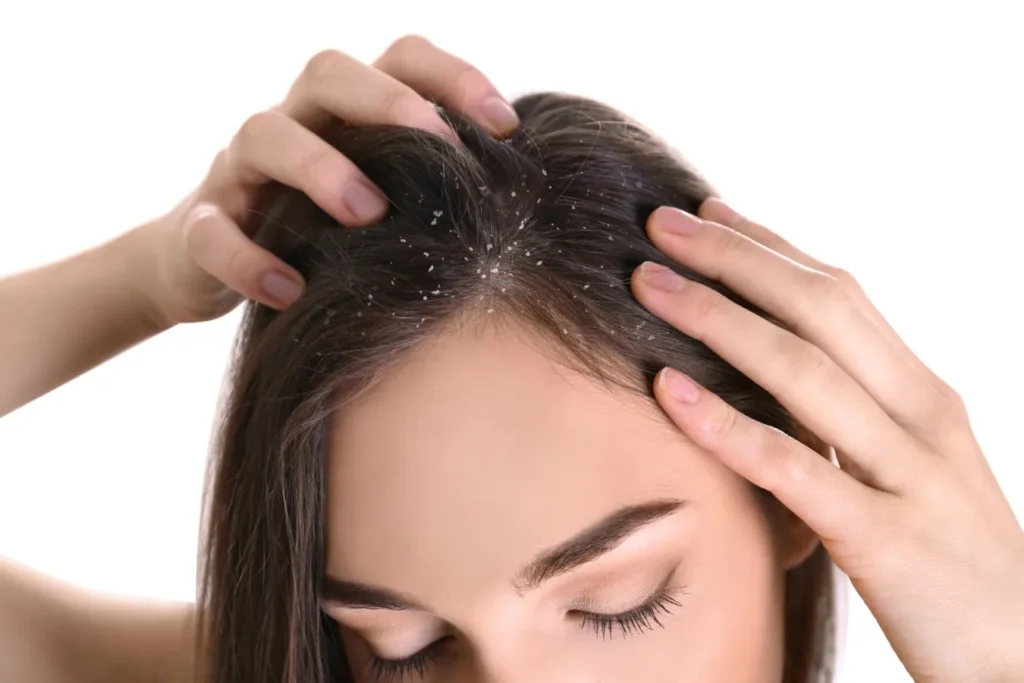Everyone has had a problem with their scalp at some point. The most common is dandruff. Although it is not a serious condition and is not contagious, it is uncomfortable due to the itching it causes. There are several treatments, including washing the hair with a mild shampoo, as well as home remedies that are beneficial for the skin.
“During the day we may notice a kind of snow or white dots on our shoulders, which we quickly shake off. But when we comb our hair we can notice them in our hair. This could be dandruff or flaking skin. We need to know how to differentiate them to give the appropriate treatment,” says Eduardo Castañeda, dermatologist.
Dandruff is a flaking of the skin, which can cause itching on the scalp. It is related to excess oil and various skin disorders and is characterized by yellow or white flakes. While flaking is a natural process of regeneration of the scalp cells.
If the flakes are dry, white transparent, and small, they correspond to dandruff. If they are oil-free, large, and yellowish or white, they correspond to flaking.
Dandruff is considered to be a symptom of seborrheic dermatitis, which affects the skin and causes redness and irritation. It begins to develop from the age of 20, although stress and hormonal problems can cause it to appear before this age.
According to dermatologist Castañeda, there are two types of dandruff:
- Dry or moderate dandruff: this is when fine, dry, white, or grey flakes appear. They do not stick to the scalp, even when it is irritated, so when you scratch your head or comb your hair, they fall to your shoulders or neck. This is a minor form of seborrheic dermatitis and is caused by the same organism.
- Thick or oily dandruff: This is also called Pityriasis versicolor and is characterized by the fact that the dandruff is oily, yellowish in color, and causes redness on the scalp. It is caused by a fungus called Pityrosporum ovale, which is found naturally on the surface of the skin.
Both types of dandruff can have various causes, such as irritated and oily skin, dry skin, sensitivity to hair care products, other skin conditions, and the proliferation caused by a fungus. In addition, excessive stress, anxiety, or some hormonal imbalances can also be the reason for its appearance.
How to remove dandruff
There are several methods for removing dandruff, which are based on essential oils of tea tree, lavender, and mint. The most recommended are those labeled to combat dandruff, although experts recommend the use of shampoos that do not contain sulfates, or petroleum derivatives, such as paraffin, alcohol, and silicones.
Ideally, hair products should contain components such as Ketoconazole, Selenium sulfide, Coal tar, Piroctone olamine, Zinc pyrithione, and Salicylic acid.
In addition, it is advisable not to use straighteners and hair dryers, aggressive treatments that dry out the hair, and bathe with very hot water.
Home remedies for dandruff
Just as there are a variety of products to combat dandruff, there are also home remedies that help stop the growth of fungi and remove irritation and dryness of the scalp. The naturopath shares some natural remedies that will help you with this condition.
- Tea tree oil: It is known to be used for acne treatments, due to its antimicrobial and anti-inflammatory properties. It is not advisable to apply it directly to the skin, especially if you have sensitive skin, so you can mix a few drops with coconut oil or with your shampoo.
- Aspirin: Acetylsalicylic acid has properties that prevent the growth of fungi that cause dandruff, and it also deeply cleanses the scalp. It is recommended to crush two aspirin tablets and mix them with three tablespoons of shampoo. Then, wash your hair with this mixture, massaging your head well and letting it sit for five minutes. Repeat the procedure with each wash until the dandruff is eliminated.
- Coconut oil: This oil restores the scalp, which is why it is one of the most well-known remedies since it reduces dandruff and relieves scalp itching. It is recommended to mix three tablespoons of coconut oil with the juice of half a lemon and massage the head for 20 minutes. Then wash the hair and let it air dry. You can use this treatment up to three times a week.
- Aloe Vera: Its antibacterial and antifungal properties help protect the skin from dandruff and reduce inflammation.
- Increase your Omega 3 intake: Omega 3 fatty acids help with skin health, so low levels of them could influence dry hair, dry skin, and dandruff. Increasing your intake would help reduce the symptoms of this condition.

